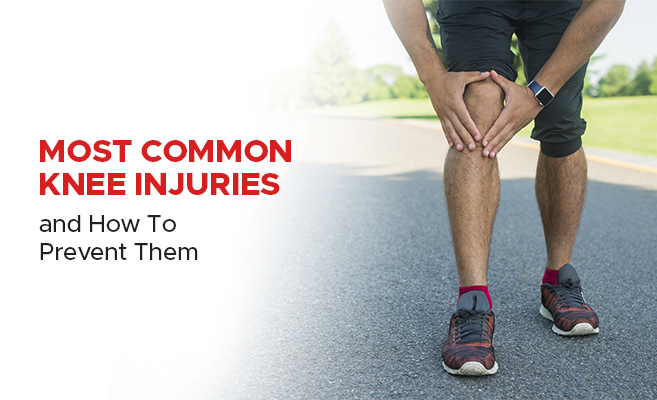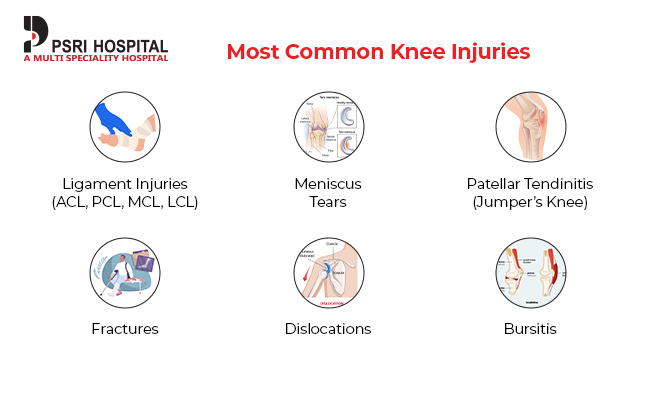Most Common Knee Injuries and How To Prevent Them?

Our knees play an important role in our daily activities, from walking and running to bending and lifting. They are among the most complex and largest joints in our bodies, making them prone to various injuries. Maintaining knee health is essential not only for mobility but also for overall well-being. Unfortunately, knee injuries are common and can directly impact your quality of life. Understanding the most common knee injuries, their causes, and how to prevent them is important for keeping your knees healthy and functional.

Most Common Knee Injuries
Here are some different kind of knee injuries and their causes:
Ligament Injuries (ACL, PCL, MCL, LCL)
Ligament injuries are among the most frequent types of knee injuries, often occurring in athletes or individuals involved in high-impact activities. The most commonly injured ligament is the anterior cruciate ligament (ACL), which is crucial for stabilizing the knee.
- Causes: Sudden changes in direction, twisting motions, or direct impacts to the knee can cause ligament injuries. Sports like football, basketball, and skiing are common culprits.
- Symptoms: Pain, swelling, and instability in the knee are typical symptoms. You might also hear a popping sound at the time of injury.
- Impact: Ligament injuries can significantly affect mobility and may require surgery for severe cases.
Meniscus Tears
The meniscus is a piece of cartilage that acts as a cushion between your thigh bone and shinbone. Meniscus tears are common knee injuries, particularly in contact sports or activities that involve twisting motions.
- Causes: Sudden twisting, pivoting, or heavy lifting can lead to a meniscus tear. It can also occur from a direct impact or age-related degeneration.
- Symptoms: Pain, swelling, and difficulty moving the knee are common symptoms. You might also experience a catching or locking sensation in the knee.
- Impact: Meniscus tears can lead to long-term knee problems and may require surgical intervention to repair.
Patellar Tendinitis (Jumper’s Knee)
Patellar tendinitis, also known as jumper’s knee, involves inflammation of the patellar tendon, which connects the kneecap to the shinbone. It is common among athletes who frequently jump or engage in repetitive knee activities.
- Causes: Overuse, repetitive jumping, or sudden increases in physical activity can cause this injury.
- Symptoms: Pain and tenderness around the kneecap, especially during activities that involve bending the knee, are typical symptoms.
- Impact: If untreated, patellar tendinitis can worsen and lead to chronic pain and functional limitations.
Fractures
Fractures, or broken bones, in the knee usually involve the patella (kneecap). They can result from high-impact trauma, such as falls or accidents.
- Causes: Direct impacts, falls, or severe twisting motions can cause knee fractures.
- Symptoms: Severe pain, swelling, and an inability to move the knee are common signs of a fracture.
- Impact: Knee fractures can require surgical treatment and a long recovery period to restore normal function.
Dislocations
Knee dislocations occur when the bones of the knee are forced out of their normal alignment. This injury is often the result of severe trauma and is less common than other knee injuries.
- Causes: High-impact collisions, falls, or sports-related injuries can lead to knee dislocations.
- Symptoms: Visible deformity, intense pain, and an inability to move the knee are indicative of a dislocation.
- Impact: Dislocations require immediate medical attention and can lead to long-term instability if not properly treated.
Bursitis
Bursitis is the inflammation of the bursae, small fluid-filled sacs that cushion the knee joint. It is commonly seen in people who kneel a lot or perform repetitive knee movements.
- Causes: Frequent kneeling, overuse, or direct trauma to the knee can cause bursitis.
- Symptoms: Pain, swelling, and warmth around the affected area are typical symptoms.
- Impact: Bursitis can cause discomfort and restrict knee movement, potentially leading to chronic issues if not addressed.
How to Prevent Knee Injuries
Preventing knee injuries involves a combination of proper care, exercise, and awareness. Here are some practical steps to help you keep your knees healthy:
Strengthen Your Muscles: Strong muscles around the knee, particularly the quadriceps and hamstrings, provide better support and reduce the risk of injury. Incorporate exercises that target these muscles, such as squats, lunges, and leg presses, into your fitness routine.
Maintain a Healthy Weight: Carrying excess weight puts additional strain on your knees, increasing the risk of injury and joint problems. Maintaining a healthy weight through a balanced diet and regular exercise can significantly reduce this risk.
Use Proper Technique: When engaging in physical activities or sports, use proper techniques to avoid unnecessary strain on your knees. Ensure that you warm up before exercises, cool down afterwards, and avoid sudden, explosive movements that can lead to injuries.
Wear Appropriate Gear: Wearing proper footwear that provides adequate support and cushioning can help prevent knee injuries, especially during high-impact activities. Additionally, using knee pads or braces can provide extra protection during sports or activities that put stress on your knees.
Avoid Overuse: Overuse injuries are common, particularly in athletes or individuals who engage in repetitive knee movements. Avoid excessive strain on your knees by allowing adequate rest and recovery time between activities and gradually increasing the intensity of your workouts.
Pay Attention to Pain: Do not ignore knee pain, as it can be an early sign of injury or overuse. If you experience persistent pain or discomfort, consult with a healthcare professional to identify and address the issue before it worsens.
Choose PSRI Hospital for Expert Knee Care
PSRI Hospital, home of the best orthopedic doctor in Delhi NCR, offers comprehensive care for knee injuries. Our experienced orthopedic surgeon in Delhi provides personalized treatment plans and uses advanced techniques to ensure optimal recovery. Whether you need advice on preventing knee injuries or require specialized treatment for knee joint injury, PSRI Hospital is dedicated to providing the highest standard of care. Contact us today to learn more about our services and how we can help you maintain healthy, pain-free knees.
FAQs
What are the most common knee injuries?
Ans. The most common knee injuries include ligament tears (like ACL and MCL), meniscus tears, patellar tendinitis, fractures, dislocations, and bursitis.
How can I prevent knee injuries?
Ans. You can prevent knee injuries by strengthening your leg muscles, maintaining a healthy weight, using proper techniques during physical activities, wearing the right gear, avoiding overuse, and paying attention to any knee pain.
What should I do if I injure my knee?
Ans. If you injure your knee, rest and avoid putting weight on it. Apply ice to reduce swelling, and seek medical advice from a healthcare professional for a proper diagnosis and treatment plan.
Why should I choose PSRI Hospital for knee injury treatment?
Ans. PSRI Hospital offers expert care for knee injuries with the best orthopedic doctor in Delhi NCR and advanced treatment options to help you recover quickly and effectively.

 Book An Appointment
Book An Appointment Virtual Consultation
Virtual Consultation





